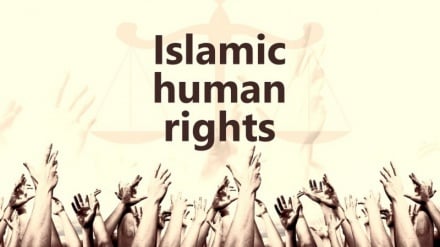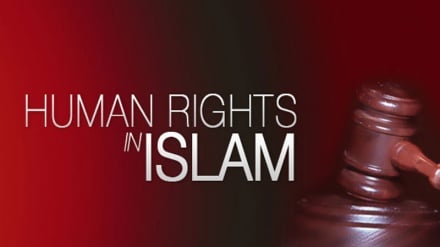Islamic human rights (11)
Today, we study the status of mankind in the divine Islamic ideology.
As a reminder, in the previous weeks we presented a number of reasons, proving that the right to determine laws on human rights belongs to God Almighty, and human wisdom and the thoughts of thinkers and scientists cannot set the human rights laws for the entire mankind, on their own. Given that mankind is the subject of laws on human rights, today we intend to elaborate on the status of mankind in the divine Islamic ideology. The presentation of this discussion is important because it specifies the ideological principles of Islamic human rights and further clarifies the aspects of Islamic human rights, while distinguishing them from Western human rights.
Mankind maintains a nature, which is dependent on his apparent physique, and an inner self which is supported by a divine spirit. All of human virtues are rooted in his inner self, and all of his wrongdoings are rooted in his nature. There is a constant confrontation between these two, and if the inner self overcomes carnal desires; this is referred to as Greater Jihad. Whenever in this confrontation, inner self emerges victorious, all angels prostrate before mankind and whenever man’s nature and carnal desires emerge victorious, mankind stoops to the level of livestock.
The grand exegete of Holy Quran, Allameh Tabatabai, refers to the nature of mankind, and believes that mankind is naturally not a civilized and law-abiding creature. Civilization is a phenomenon which has been imposed on mankind. Each one of mankind is relatively invasive, and because he witnesses that others are also making encroachments, he tries to set boundaries for these encroachments and to balance them out by establishing a number of rules and regulations. Hence, if mankind accepts the rule of law, it is because he wants to put these encroachments in order.
Despite mankind’s nature, his spirit is prepared for growth and elevation.
The 70th ayah of Surat al-Isra in Holy Quran notes: “Certainly We have honored the Children of Adam, and carried them over land and sea, and provided them with all the good things, and given them an advantage over many of those We have created with a complete preference.”
Man’s honor and dignity shows that he truly maintains a superior existence. In other words, human dignity shows that he maintains a superior quality. Hence, God Almighty addresses Satan after creation of mankind, according to the 75th ayah of Surat Saad in Holy Quran. Based on this ayah; God said, ‘O Iblis! What keeps you from prostrating before that which I have created with My own two hands?
The reference to creation of mankind by God’s two hands goes to show that mankind is highly valuable. Given this dignity, all ethical and legal teachings should focus on this theoretical principle, and should completely match this principle. When we accept that mankind is highly valued, naturally we conclude that freedom and security are not only man’s rights, and they should also be prepared and regulated in a manner that matches man’s honor and dignity.
Mankind is a creature that seeks God. Within 15th ayah of Surat Fitr in Holy Quran, God notes: “O mankind! You are the ones who stand in need of Allah.”
Two facts are clarified from this ayah of Holy Quran. Firstly, man doesn’t maintain an independent existence, and secondly his bond is only with God and he is not dependent on anyone else. Hence, any laws set for mankind should be fully compatible with his God-seeking soul and spirit. Those legal teachings which assume an independent existence for mankind, or claim that mankind is dependent on someone other than God, do not originate from the one and only creator of the world, God Almighty.
Holy Quran has introduced mankind as an immortal creature. The 6th ayah of Surat al-Inshiqaq in Holy Quran notes: “O man! You are laboring toward your Lord laboriously, and you will encounter Him.”
These statements are related to the entire mankind. So in the view of Holy Quran, mankind is an immortal creature. Obviously, man’s life does not end with death. After death, man’s spirit breaks free from human body and continues his eternal life. So, mankind, throughout this lengthy path, is in need of rules and regulations which have been determined and set by God.
Holy Quran considers mankind an immortal creature. Hence, the one and only creature of the world, God Almighty, has prepared and organized all of mankind’s life plans in all of the phases of man’s eternal existence and has set a number of traditions for each of the phases of man’s life. The personal and collective life of mankind doesn’t just belong to the initial phase of man’s existence, which is the material world. Personal and collective life also exists in Hereafter, but is different from the personal and collective life of mankind in the material world.
The main difference of these two systems is that mankind cannot meet all of his needs in the material world, on his own. Hence, mankind, in order to meet his needs in the material world, is dependent on others and therefore leans toward a collective life. But, this is certainly not the case in Hereafter. In Hereafter, no one needs to work or make efforts, and every one observes the result of whatever he or she has prepared and has done in the material world.
One of the ideological principles of Islamic human rights is the especial bond established between mankind and the world, and his duty toward divine blessings in this world. The pivotal aspect of this ideology is that man’s good deeds or misdeeds highly contribute to emergence or reduction of blessings in the material world.
Hence, in regard to utilization of blessings in the material world, one cannot act in a manner that would be incompatible with peaceful coexistence.
Holy Quran teaches us to choose the right path in the utilization of blessings in the world.
We came to realize that in the view of Holy Quran, mankind is a creature which maintains dignity, seeks God, is immortal, and maintains a personal and collective identity. Man has a solid bond with the universe, and worldly blessings are at his disposal so that he would attain salvation. God Almighty, via sending prophets and divine books has set a number of divine laws for mankind. Humans, via compliance with divine instructions, can attain a highly elevated status, or can stoop to the level of animals by refusing to abide by God’s instructions.
RM/ME


